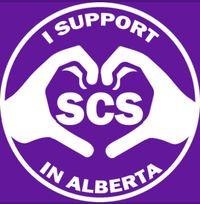On March 5th, 2020, the Alberta Government released their anti-harm reduction propaganda piece, The SCS Review Report. I remember when Associate Minister Jason Luan held a press conference to announce the report. Vindicated by his own confirmation bias he declared supervised consumption services (SCS) and overdose prevention sites (OPS) systems of chaos.
“I remember the SCS review committee co-chair and TV interventionist, Geri Bemister-Williams, claiming that oxygen administration was neither necessary nor life-saving in many overdose responses in the Alberta sites.”
They all looked so pleased with themselves, signalling that they had accomplished their mandate and could move on. Since the report’s release, the Alberta government has closed down essentially the world’s busiest SCS, ARCHES, due to alleged financial misappropriation. As another slap in the face, they tried to replace it with a mobile van. Even after the Lethbridge Police were able to debunk claims of financial misappropriation, there have been no efforts by the provincial government to resume funding to this life-saving service, in a community that has been ravaged by the toxic and volatile drug supply. The Alberta government has also tried, and failed, to shut down injectable opioid agonist therapy (iOAT) clinics in both Edmonton and Calgary. They’ve gone so far as directing Alberta Health Services (AHS) to remove the term ‘Harm Reduction’ from their policies. Make no mistake, this is intentional.
It is a shame that this report is still being used to disparage life-saving harm reduction services in Alberta. The report itself has been so widely discredited and refuted, that scientists across Canada penned an open letter requesting the report to be retracted, citing a lack of validity and reliability. Criminologist, Dr. Jamie Livingston went even further, submitting a publication to the Harm Reduction Journal highlighting significant methodological weaknesses in the report. What has become abundantly clear unfortunately, is that the Alberta Government has no intention on retracting this report. And why would they?
“Whether it’s good data or bad data, the report served its purpose. Nothing else matters to a government with a foregone conclusion and a vested interest allowing people who use drugs to die.”
There is so much that could be said about the Alberta SCS Report. We could talk about how the committee selected to produce the report consisted of zero individuals who had worked at or accessed an SCS/OPS. We could talk about how the committee was directed to ignore the merits of harm reduction and ‘other social issues such as housing and homelessness’. We could talk about how the members of the review committee have been exposed for lavish and unethical spending, all while they built a case to shut down ARCHES for financial mismanagement. We could talk about all of these things, and so much more. But the report is one-year-old, and very little of that information matters now.

The problem with bad data is that it lingers, favored by those with motives that extend beyond truth and transparency. People love to hear what they want to hear, and when it looks legit and sounds legit, that’s all they need. In the case of the Alberta SCS Report, the purpose was to manufacture consent in the dismantling of harm reduction services, particularly SCS/OPS. While many of us advocating for harm reduction in Alberta have found ourselves in a reactionary space, constantly waiting for the next big cut from premier Jason Kenney, it is important that we do not lose sight of the bigger picture. The impacts of the SCS review report, flawed though it may be, have extended beyond Alberta. In fact, the report has found its way to the United States and is being cited by detractors of harm reduction. It’s now being weaponized and used to prevent new SCS/OPS’s from being implemented.
It’s been one whole year, and the Alberta SCS Report endures, festering in conservative corners despite its complete lack of credibility. No amount of open letters or criticisms will prevent it from being used as a tool of oppression in the future. Even while Alberta experiences its highest rate of overdose deaths ever, a staggering 1,128 deaths in 2020, the Alberta Government presses on with their plans. The only way to lessen the impacts of bad data, is for the authors and manufacturers of that data to admit their fault. Members of the SCS review panel played their role, and should be held accountable for the results of their sloppy, biased, and opinionated work. Every time a politician or decision-maker cites that report as means to prevent, restrict, or dismantle a life-saving and evidence-based service, the Alberta SCS panel and the Alberta Government are to blame. There is blood on their hands, more and more every day, and the stains will never wash away.




